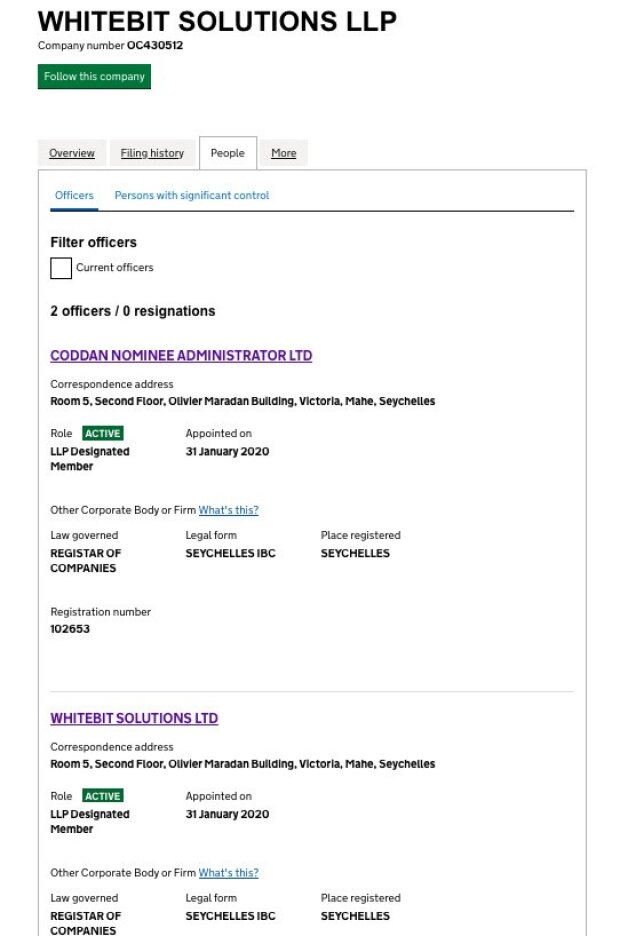Криптобиржа WhiteBIT регулярно попадает в громкие скандалы. Например, 21 ноября 2023 года, биржа обманула своих клиентов, предоставив возможность обмена монетами до официального запуска торгов. Это привело к перенасыщению рынка и резкому падению цены монеты.
В это же время произошел еще один скандал. Национальный банк Грузии выдал лицензию на новый цифровой банк Hash, одним из основателей которого является Владимир Носов, известный как официальный владелец WhiteBIT. Оппозиционная партия Единое Национальное движение Грузии обвинила новый банк в потенциальном использовании для легализации денежных средств из рф и их возможном влиянии на предстоящие выборы.
Но такие скандалы лишь верхушка айсберга. Самые главное происходит в тени. Не случайно в феврале 2023 года Высший антикоррупционный суд постановил, что Национальное антикоррупционное бюро Украины должно провести расследование в отношении возможного незаконного вывода средств из страны через биржу WhiteBIT и её связи с рф.
Криптобиржа WhiteBIT: кто же настоящий владелец?
WhiteBIT позиционирует себя как украинская биржа, основанная в 2018 году. Владимир Носов — её официальное медийное лицо и руководитель. На момент создания компании его бизнес-партнерами были Мария Репешко, Анна Янковская и Никита Шенцев.
Официально Шенцев и Репешко продали свои акции WhiteBIT Владимиру Носову после того как против биржи началось расследование в 2023 году. Но инсайдеры говорят о том, что именно семья Шенцевых, а точнее известный депутат «регионал» Дмитрий Шенцев является реальным владельцем криптобиржи WhiteBIT. Он помогает проводить через эту биржу российские деньги.
По данным СМИ, сейчас оба Шенцева находятся в рф. При этом Шенцева-младшего лишили украинского гражданства. Что неудивительно, ведь ему, как и его отцу всегда был ближе «русский мир».

Именно Дмитрий Шенцев был среди ярых лоббистов так называемой «Новороссии». Он даже получил медаль из рук президента рф владимира путина «за большой вклад в популяризацию русского языка». 16 января 2014 года он голосовал за диктаторские законы, которые должны были уничтожить Майдан. А в 2018-м году Шенцев был среди 36-ти депутатов, голосовавших против Закона о признании украинского суверенитета над оккупированными территориями Донецкой и Луганской областей.
Так что Дмитрия Шенцева можно назвать эталонным пророссийским политиком. Который продолжает помогать стране агрессору и сейчас. Одним из ключевых источников дохода биржи WhiteBIT является вывод средств сторонников рф из Украины за границу, а также отмывание российских денег.
Российские спецслужбы и «прачечная» от WhiteBIT
Значительная часть доходов WhiteBIT перевод российских денег через биржу не только в Украине, но и за рубежом.
Чтобы скрыть эту неприглядную сторону и дистанцировать компанию от токсичной семьи Шенцевых, которым принадлежит 60% корпоративных прав биржи, на публичной арене появился Владимир Носов.

WhiteBIT связан со спецслужбами рф и помогает им решать финансовіе вопросі в разніх странах мира. Так в публикации на Cryptointelligence отмечается, что в структуру собственности криптобиржи WhiteBIT входит компания Coddan Nominee. Эта компания является частью обширной оффшорной сети и также была среди основателей другой фирмы – Sofbiz.
По данным журналистского расследования, Sofbiz подозревается в финансировании государственного переворота в Черногории в 2016 году. Правоохранительные органы Черногории установили, что 1,5 миллиона евро, инвестированные в переворот через Sofbiz, предназначались для организации убийства тогдашнего премьер-министра, а впоследствии – президента Черногории Мило Джукановича.
Расследование, проведенное группой Bellingcat установило, что к попытке переворота в Черногории причастны офицеры ГРУ российского Генштаба – Эдуард Шишмаков и Владимир Моисеев. Эти офицеры сотрудничали с пророссийскими политиками Черногории и привлекали сербских граждан к своему делу.
Несмотря на доказательства связи компании Coddan с попыткой государственного переворота в Черногории, она не была ликвидирована. Вместо этого, спустя несколько лет, Coddan появилась среди учредителей криптобиржи WhiteBIT.

Ещё один скандал, связанный с WhiteBIT, произошёл в Грузии. Национальный банк страны выдал лицензию на открытие цифрового банка Hash. Представители оппозиционной партии «Единое национальное движение» заявили, что основная цель нового цифрового банка — легализация российских денег и их использование на предстоящих выборах.
Примечательно, что среди основателей банка Hash находятся одни из самых богатых людей Грузии, Сулхан и Лаша Папашвили. Их партнером стал официальный владелец WhiteBIT, украинский бизнесмен Владимир Носов.
Эстонское издание «Деловые новости» недавно обратило внимание на интересный аспект деятельности WhiteBIT.
Согласно публикации, криптобиржа подозревается в содействии выводу средств с российской платформы BTC-e. Основатель BTC-e, россиянин Александр Винник, был экстрадирован в США летом 2022 года по обвинению в отмывании 4 миллиардов долларов.
Финансы этой биржи оставались без движения в течение долгого времени, однако в марте 2023 года начались подозрительные операции. IT-журналисты заметили, что средства с российской биржи разбиваются на небольшие суммы и выводятся через различные сервисы. В частности, около 12 миллионов долларов США было переведено на якобы украинский стартап.
Для рф характерно прикрываться брендами, которые выглядят как украинские стартапы, инвестировать в их развитие и использовать их для прикрытия незаконных операций и финансирования действий против цивилизованного мира и самой Украины.
WhiteBIT – яркий тому пример. Эта криптобиржа вызывает серьёзные подозрения и требует тщательной проверки со стороны правоохранительных органов Украины.


